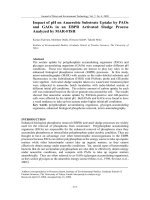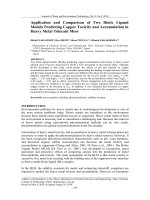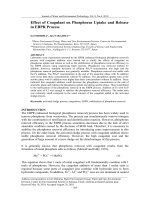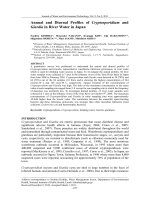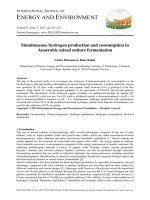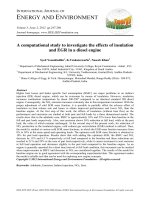- Trang chủ >>
- Khoa Học Tự Nhiên >>
- Vật lý
democracy beyond borders justice and representation in global institutions nov 2004
Bạn đang xem bản rút gọn của tài liệu. Xem và tải ngay bản đầy đủ của tài liệu tại đây (1.38 MB, 239 trang )
DEMOCRACY BEYOND BORDERS
About the Author
Dr. Andrew Kuper is a Managing Director at Ashoka—Innovators
for the Public, which supports and connects social entrepreneurs
in over sixty countries. He is also a Fellow of Trinity College,
Cambridge University.
Born and raised in South Africa, Dr. Kuper holds his PhD from
Cambridge. He has been a visiting scholar at both Harvard and
Columbia. As Senior Associate at the Carnegie Council on Ethics and
International Affairs, he directed the project on multilateral strategies
to promote democracy. He is also Co-Director of Kuper Research, a
media and sociopolitical consultancy based in South Africa.
Dr. Kuper has published on the media and democracy, charity and
global poverty relief, globalization and the role of corporations in
development. He is the editor of Global Responsibilities: Who Must
Deliver on Human Rights?
DEMOCRACY BEYOND
BORDERS
JUSTICE AND REPRESENTATION IN
GLOBAL INSTITUTIONS
ANDREW KUPER
1
1
Great Clarendon Street, Oxford OX2 6DP
Oxford University Press is a department of the University of Oxford.
It furthers the University’s objective of excellence in research, scholarship,
and education by publishing worldwide in
Oxford New York
Auckland Cape Town Dar es Salaam Hong Kong Karachi
Kuala Lumpur Madrid Melbourne Mexico City Nairobi
New Delhi Shanghai Taipei Toronto
With offices in
Argentina Austria Brazil Chile Czech Republic France Greece
Guatemala Hungary Italy Japan Poland Portugal Singapore
South Korea Switzerland Thailand Turkey Ukraine Vietnam
Oxford is a registered trade mark of Oxford University Press
in the UK and in certain other countries
Published in the United States
by Oxford University Press Inc., New York
© Andrew Kuper 2004
The moral rights of the authors have been asserted
Database right Oxford University Press (maker)
First published 2004
First published in paperback 2006
All rights reserved. No part of this publication may be reproduced,
stored in a retrieval system, or transmitted, in any form or by any means,
without the prior permission in writing of Oxford University Press,
or as expressly permitted by law, or under terms agreed with the appropriate
reprographics rights organization. Enquiries concerning reproduction
outside the scope of the above should be sent to the Rights Department,
Oxford University Press, at the address above
You must not circulate this book in any other binding or cover
and you must impose the same condition on any acquirer
British Library Cataloguing in Publication Data
Data available
Library of Congress Cataloging in Publication Data
Data available
Typeset by Newgen Imaging Systems (P) Ltd., Chennai, India
Printed in Great Britain
on acid-free paper by
Biddles Ltd., King’s Lynn
ISBN 0–19–927490–8 978–0–19–927490–1
ISBN 0–19–929165–9 (Pbk.) 978–0–19–929165–6 (Pbk.)
13579108642
For Jos, Laurance, and Kate Kuper
Whose love and clear-eyed approaches to change
are the inspirations for this work, and this life
This page intentionally left blank
Contents
Acknowledgements ix
Introduction: Walking the Tightrope 1
1. Context 1
2. Justification 3
1. Global Justice 7
Prelude: Rawls’ Constructivism and Thin States 8
1. Incorporation: Different Interests of
Persons and States 14
2. Toleration: The Universal Scope of Global Justice 18
3. Cohesion: Towards Non-statist Principles of
Global Justice 25
4. Realism: Practical Application in a Non-ideal 34
World
2. Why Deliberation Cannot Tame Globalisation 47
1. The Scale of Politics 48
2. Does Habermas Demand Too Much of
Persons and Institutions? 50
3. The Deliberative Hall of Mirrors 61
4. Representation Contra Deliberation 71
3. Representation as Responsiveness 75
1. Representation by Whom or What? 75
2. The Role of the Represented 78
3. Judging the Best Interests of the Public 80
4. The Limits of Elections: Accountability,
Reliability, Receptivity 90
5. The Democratic Doubters: Schumpeter,
Popper, Przeworski 96
6. The Plurality of Powers 100
7. Accountability and Advocacy Agencies: Reducing
Power Imbalances 106
8. A Charter of Obligations: Reducing Bureaucracy 113
9. Responsive Global Citizenship: Reducing Passivity 117
4. Transforming Global Institutions 137
Prelude: Philosophy and Institutional Design 138
1. Jurisdiction of the International Criminal Court 140
2. Jurisdiction of the International Court of Justice 148
3. Membership in the United Nations 158
4. Unbundling Transparency International 179
Conclusion: Responsive Democracy 191
1. Ten Dimensions of Theories of Global Justice
and Democracy 191
2. Rawls and Liberal Statism 193
3. Habermas and Deliberative Democracy 194
4. Responsive Democracy: Underlying Ideas
about Power and Knowledge 196
5. Ideals in Politics 202
Bibliography 205
Index 219
viii Contents
Acknowledgements
My most important intellectual debt is to Onora O’Neill, whose incisive
comments and Menschlichkeit improved my thinking and well-being at
every turn. Amartya Sen helped me to integrate key normative and
empirical concerns. John Dunn, David Held, and Istvan Hont vigor-
ously exposed my weaknesses, and then strengthened my grasp of the
context and contentions of the text. Thomas Pogge lent me his ear and
his air-conditioned office, both of which proved indispensable to sur-
viving summers in New York. Raymond Geuss, John Tasioulas, and
three anonymous reviewers offered inspiring challenges in the home
stretch.
During my year at Harvard, made possible by the trustees of the
Henry Fellowship, I profited greatly from regular discussions with
Sandra Badin, Seyla Benhabib, Bryan Garsten, Michael Sandel, and
Tim Scanlon. The rest of the research was funded entirely by Trinity
College, Cambridge, where my fellow Fellows and my students pro-
vided an immensely stimulating home and work environment.
Some lifelong friends provided not only emotional but also intellec-
tual and logistical support. Thank you to Lucy Delap, Jackie Dugard,
Michael Pitman, Jimmy Roth, Simon Stacey, and Nir Tsuk. For empa-
thy and exhilaration, I also thank Jude Browne, Adam Freudenheim,
Fredrik Galtung, the other Kupers, Karen Lewis-Enright, Fiona
Melrose, Annie Moser, the Oppenheimers, Adina Oskowitz, Robin
and Tricia Pearse, Thiru and Ashika Pillay, Ornit Shani, and Sigal
Spigel. Finally, I owe unique debts to Nim Geva, for laughter in the
dark, to Zeev Emmerich, for daily illumination, and to Gordon Kuper,
for devotion beyond borders.
I have dedicated the book to my family, who have crossed conti-
nents, actual and emotional, to be with me in the ways that matter.
All these generous people shaped the book and its author.
However, according to the universal principles of academic justice,
the author alone is responsible for every deficiency.
An earlier version of Chapter 1 appeared as ‘Rawlsian Global
Justice: Beyond The Law of Peoples to a Cosmopolitan Law of
Persons’, in Political Theory, Vol. 28, No. 5 (2000), 640–74.
An earlier version of Chapter 2 appeared as ‘Why Deliberation
Cannot Tame Globalisation: The Impossibility of a Deliberative
Democrat,’ in Analyse & Kritik, Vol. 25, No. 2 (2003), 176–98.
This page intentionally left blank
Introduction: Walking the Tightrope
To live is to build a ship and a harbor
at the same time. And to complete the harbor
long after the ship was drowned.
Yehuda Amichai
1. Context
Liberalism and modern democracy are now the most widely accepted
forms of official justification for political rule. Both doctrines were
developed largely in and for nation-states. Yet, in the face of what is
bluntly called globalisation, it is arguable that an international polit-
ical system based on states will be unable to meet some of the most
daunting political challenges that confront our world. Is it possible to
develop an institutional framework that is not based primarily on
states, one that would enable justifiable and effective rule? In particu-
lar, can the principles and practices of liberal justice and representative
democracy be extended, to positive effect, beyond the state contexts
for which they were devised? I argue in this book that we should end
our dubious romance with the nation-state and that we can do so in
favour of a more suitable prospect: not a world state, nor a system of
superstates, but a multiform global system that I shall call Responsive
Democracy.
The book does not—I should stress—seek to explain at length
the complex processes and phenomena that fall under the rubric of
globalisation.
1
I accept from the outset that there has been a massive
1
However malleable and abused, the term captures a widespread perception
about our era. Here are some early prominent examples: human individuals and com-
munities are enmeshed in a network of ‘accelerating interdependence’; ‘time-space
growth in the extent, intensity, velocity, and scope of impact of
cross-border human social relations and transactions.
2
My concern
is with the glaring absence of a corresponding increase in our capacit-
ies to exercise political control over this enmeshed world. This deficit
is partly due to a peculiar way in which our practical imagination is
constrained.
If liberalism and democracy are seen as ineradicably tied to the state
form, and yet the state is failing to fulfil important governmental
tasks, we are in deep trouble. We are left then with only two altern-
atives: a system of liberal democratic states that would often be unstable
and ineffective, or some form of non-state global order that would be
illiberal and undemocratic. (We might well get a fitful combination of
the two.) Neither is an appealing prospect. While liberalism and
democracy are far from flawless guides to political organisation and
human conduct, both have had significant advantages over the major
ideological and practical competitors. The need to retain these advant-
ages on its own would provide sufficient justification for attempting
to develop a non-statist account of liberalism and democracy. But
I shall provide a stronger justification—to wit, that many of the flaws
in current liberal democratic thought and practice are in fact the result
of the two doctrines being conceived in statist terms and affixed to state
structures. Our best hope lies in reconstructing the theory and practice
of liberal justice and democratic representation on foundations that
are neither nationalist nor statist.
To this end, the book presents the core components of (1) a theory
of global justice that arises out of a critique of the influential political
philosophy of John Rawls; (2) a theory of democratic representation
that constitutes an alternative to the approach taken by Jürgen
Habermas and his deliberative democratic followers; and (3) a theory
2 Introduction
compression’ occurs ‘as interaction accelerates’, making the world a far smaller
and more immediately reactive place; and, as the range and depth of shared activ-
ities increase, the impact of ‘action at a distance’ is greater than ever before (see,
respectively, K. Ohmae, The Borderless World (London: Collins, 1990);
D. Harvey, The Condition of Postmodernity (Oxford: Blackwell, 1989); and
A. Giddens, The Consequences of Modernity (Cambridge: Polity, 1990)).
2
Here I follow D. Held, A. McGrew, D. Goldblatt, and J. Perraton, Global
Transformations: Politics, Economics and Culture (Cambridge: Polity Press,
1999). This descriptive account of globalisation is superior to many others of
its kind partly because, together, the co-authors are able to traverse traditional
disciplinary boundaries.
Introduction 3
of how political and moral ideals that are necessarily framed in abstract
terms can help orient practice in messy, non-ideal conditions. Together,
these three currents of the text form a novel, non-state theory of global
justice and democracy.
I am aware, all too aware, that these are large promises on which to
deliver. Partly for this reason, I do not ask the reader to rest content
with highly abstract reflections, but illustrate how my approach
enables us to specify beneficial and feasible reforms to four rather dif-
ferent global institutions: the International Criminal Court, the
International Court of Justice, the United Nations General Assembly
and Security Council, and Transparency International.
The guiding insight that makes these theories plausible, practicable,
and indeed compatible is that it is possible to generalise and carry to
a higher order of abstraction the traditional idea of the separation
of powers. I free this idea from its usual moorings in three ways. First,
I show that there is no moral or prudential justification for the claim
that political power must be located ultimately at one level of authority
(e.g. the state); the capabilities of persons, especially vulnerable persons,
are best protected and advanced by dispersing power to several levels
of authority that operate above and below the state. Second, I show that
the classical tripartite separation of powers fails in important respects;
further types of authoritative powers are also required to compel
authorities to check and balance one another. Third, I show that these
extensions, properly combined, do more than protect citizens against
the might of any one overweening power; the combination also has the
effect of improving political inclusion and mobilisation, as well as polit-
ical judgement. Accordingly, this radically revised idea of the separation
of powers forms a practical general framework that could address both
liberal and democratic concerns about global order.
2. Justification
What allows, indeed requires, me to make this argument is a certain
conception of political legitimacy. Against Rawls, I maintain that lib-
eral conceptions of the person and of toleration are profoundly at
odds with any political order that recognises nationalism and statism
in its basic structure.
3
I develop a liberal theory of justice that is
3
This is not a historical but a conceptual claim; however, I believe that the
history of liberal states is replete with this disruptive (and, I shall argue, avoidable)
tension.
termed ‘cosmopolitan’ because it attaches primary moral significance to
individuals considered as free and equal persons, and never merely as
members of associations or nation-states. This moral cosmopolitanism
leads me to argue—on grounds of both equality and efficiency—for
shifting much political authority away from the centralised state and
towards a balance of local, regional, and global institutions. I am also
led to reject Rawls’ attempts to disavow democratic rights and obliga-
tions at the global level: the justification for and legal protection of very
basic human rights cannot be separated out from wider rights claims
nor from a wider normative and institutional framework.
The question then becomes how these joint commitments—to
democracy and to institutional cosmopolitanism—can be reconciled:
How is it possible for individuals to have any control or influence
where the political order is so complex and operates at such great
scale? Against Habermas, I do not think that individuals are best
included in governance if and when the political system maximises
various forms of deliberation between citizens. Indeed, I show that
the maximising requirements on communication and participation
contained in Habermas’ theory of ‘deliberative democracy’ can be
met only by making assumptions about human cognitive capacities
and about institutional capabilities that are not plausible in any
remotely large-scale and pluralistic society. I argue, further, that all
attempts to rescue deliberative democracy, through forms of repres-
entation that are supposed to ‘mirror’ participation, must fail. These
attempts do not make adequate room for the exercise of discretion by
representatives, portray citizens’ actual views in distorted ways, and
produce poor quality political judgement. Purportedly ‘all-inclusive’
deliberation in fact would contribute to the exclusion of vulnerable
and marginal individuals. However, important lessons can be learnt
from these failures, especially concerning the parameters of a ‘thicker’
theory of representation—a theory that conceives of the function of
representatives as quite different from a glorified mirroring, aggrega-
tion, or interpretation of citizens’ views.
The key to reconciling democracy with institutions of great scope
and complexity is to recognise that the notion of an agent as repres-
entative must be understood as deriving from the more basic notion
of a representative system. When we ask the general question as to
whether citizens ultimately have control over political decisions, our
fundamental concern is not whether any one agent or group of agents
pursues citizens’ interests and articulates citizens’ views; rather, we
are asking whether there is a systematic causal connection between
citizens having certain interests and views (on the one hand) and such
4 Introduction
interests and views being identified and pursued by their political system
(on the other). I argue, however, that existing democratic devices
such as elections and party systems fall significantly short in achieving
this kind of responsiveness. Moreover, there are good reasons to think
that ‘civil society’ cannot compensate adequately for the shortcomings
of these formal mechanisms. I propose three kinds of institutional
innovation that are required to induce representatives to collectively
judge and act in the interests of citizens and with appropriate attention
to citizens’ views.
The first innovation is to introduce formal institutions with powers
that cross some traditional political–juridical divides. These ‘advocacy
and accountability agencies’ would supply relevant information and
assistance to various authorities and to a majority of citizens. Advocacy
and accountability agencies would also act as professional contesters on
behalf of certain vulnerable individuals and minorities. The second
innovation is to bring non-state, non-territorial actors—including non-
governmental organisations and transnational corporations—carefully
into the formal structures of governance, thereby harnessing the bene-
fits of their expertise even while increasing our collective capacity to
control their activities. The third and final innovation is to place
robust requirements on the dealings between these political actors, by
enshrining a ‘charter of obligations’ in international law—a charter
that distinguishes the capabilities of authorities (what they can do)
from their competences (what they may do) from their obligations
(what they ought to do). The charter would not so much reduce polit-
ical friction as channel it towards more constructive results. The three
innovations together would better balance the distribution of respons-
ibilities, would reduce harmful bureaucratic forms of communication
and interaction, and would equip citizens with enhanced means to
contest and control political decisions.
None of this is to say that there is no place for the state in govern-
ance. But it is to say that we should not continue to conceive of other
kinds and levels of political authority as mere band-aids, applied with
very limited success to remedy the deficient and detrimental operations
of states. Rather, each different authority—the state no less or more
than any other—should derive its legitimacy directly from its role in
a complex division of political labour. Engaging in recent debates
about the two World Courts, the UN, and advocacy agencies such as
Transparency International, I illustrate how the current (largely stat-
ist) division of global political labour can be reformed feasibly and
beneficially. I show how statist and deliberative modes of thought lead
to a mischaracterisation of the problems that afflict these institutions
Introduction 5
and to an impoverished conceptualisation of potential routes to
reform.
4
The integrated normative and institutional framework presented in
these pages is inherently speculative: since we live in a world without
many strong non-state liberal democratic structures, our basic ques-
tion is not ‘what works best at present?’ but rather ‘what may we
reasonably and realistically hope will work in the future?’ None of this
implies that a normative theory of liberal justice and democracy can
avoid tests of practicability, or that such a theory will not need to be
constantly adjusted in light of empirical hazards. Rather, we are inter-
ested in a political theory above all because it might supply a coherent
and justifiable approach for dealing with the vicissitudes and opportu-
nities of our shared future. No amount of empirical investigation is
sufficient to answer such fundamental and forward-looking moral
concerns.
In our time, the pressing set of problems becomes not only what lib-
eral democracy is and ought to be (content) but also where liberal
democracy is and ought to be (scope). I have attempted to provide a sys-
tematic account of how we might begin to respond to these problems.
Still, considering the many promises above, the reader would be wise to
be wary at this point. As Wittgenstein put it, with characteristically wry
acuity, ‘If someone tells me he has bought the outfit of a tightrope
walker I am not impressed until I see what he has done with it’.
5
6 Introduction
4
Although there are many important lessons to be learned from federal
thought and practice, I am sceptical of both the idea of a world state (Chapter 1),
with voting for one federal assembly (Chapters 2 and 4), and the traditional idea
of a limited tripartite separation of powers (Chapter 3). As will become evident,
Responsive Democracy is not democratic federalism. The global order for which
I argue is not world federalism.
5
R. Monk, Ludwig Wittgenstein: The Duty of Genius (London: Vintage,
1991), 464.
1
Global Justice
Beyond The Law of Peoples to a Cosmopolitan
Law of Persons
John Rawls’ The Law of Peoples (LP) represents a culmination of his
reflections on how we might reasonably and peacefully live together
in a just world.
6
My aim in this chapter is to show that a theory of
global justice can be developed that is more in keeping with the
Kantian constructivist procedures Rawls once employed for domestic
justice in Political Liberalism and A Theory of Justice.
7
This result is
important because it helps establish that my alternative conception of
global justice better realises some fundamental liberal values, even on
Rawls’ own terms.
Rawls has a strong hold on the imaginations of political theorists,
but that is not the main reason I have adopted the approach of read-
ing and responding to his work so closely. Rather, it seems to me that
his later work at once exemplifies the orthodoxy of ‘liberal statism’
that dominates the field and, along with his earlier work, contains
powerful conceptual resources for overcoming that inconsistent and
pernicious orthodoxy.
My core argument is that Rawls has begged some of the central
questions of global justice by adopting at the outset a ‘thin statist’
conception of the legitimate divisions between persons who share
a world. Once this ungrounded assumption is removed, the nature and
6
John Rawls, The Law of Peoples (Cambridge, MA: Harvard University
Press, 1999a).
7
John Rawls, Political Liberalism (New York: Columbia University Press,
1993a) and A Theory of Justice (Oxford: Oxford University Press, 1971). Also
see his ‘Kantian Constructivism in Moral Theory’, Collected Papers (Cambridge,
MA: Harvard University Press, 1999b), 303–59.
boundaries of the basic political units which the principles of global
justice coordinate might look quite different, as might the principles
themselves. Although my focus is on ideal theory, on formulating
a moral vision of justice in a cosmopolitan world order, the closing
section does discuss relevant implications for non-ideal theory.
The chapter is structured as follows: The introductory section out-
lines Rawls’ project and constructivist methodology in LP, with a view
to characterising his thin statism in particular. It briefly articulates four
arguments for his position. Each of the next four sections explicates
and then criticises one of those four arguments and in so doing further
develops an alternative conception of global justice. Sections 1 and 2
consider how widely the scope of liberal moral and political concern
ought to be drawn, arguing for representation of persons through
a global rather than a two-stage (domestic and then international) ori-
ginal position. Section 3 explores the cosmopolitan institutional implica-
tions of this modified Rawlsian procedure and elaborates a politically
liberal conception of ‘plurarchic sovereignty’. Section 4 defends the
relevance of that ideal conception of justice for realistic political action
in the decidedly non-ideal conditions of the contemporary world. In
closing, I provide brief illustrations of appropriate action in two con-
tested issue-areas: the rules of engagement with illiberal states and the
use of force in humanitarian intervention.
The most crucial differences between Rawls and me are the follow-
ing: (1) he effectively supports a system of unitary nation-states with
limited sovereignty, while I reject that whole idea in favour of a more
multiform institutional configuration; (2) he disavows democratic
rights at the global level, while my argument establishes that the rights
to full free speech and democracy are fundamental requirements of
global justice. We are thus led to support quite different liberal
approaches to the aims and methods of world politics. Indeed, it is the
need to reconcile my joint commitments to plurarchic sovereignty
and to democracy that makes the argument of the rest of the book
necessary: I am compelled to provide a normative theory of demo-
cracy for a complex world in which political authority is no longer the
predominant preserve of the state.
Prelude: Rawls’ Constructivism and Thin States
In LP, Rawls attempts to provide ‘a particular political conception of
right and justice that applies to principles and norms of international
law and practice’ (LP 3). The question to which this conception
8 Global Justice
Global Justice 9
answers is the following: how can the conception of justice as fairness,
elaborated in Political Liberalism for a closed and self-sufficient liberal
democratic society, be convincingly ‘extended’ to cover relations
between societies, including some non-liberal societies (LP 9)? This
question emerges since, after the principles of domestic justice have
been decided upon, many issues of justice remain to be resolved—
namely, those which arise once the assumption of a closed society is
dropped. How is a domestically just society to interact with other soci-
eties? Rawls thinks the extension of political liberalism to global justice
can be achieved by running a second session of the original position.
8
At this ‘second level’, the parties in the original position represent
peoples, with the result that the constructivist procedure models con-
ditions for arriving at terms of cooperation that are ‘fair to peoples
and not to individual persons’ (LP 17, n. 9). Persons are not the relevant
‘(moral) actors’ precisely because persons’ basic claims to justice have
already been taken into account (LP 10): the principles of domestic
justice are established prior to and independently of the principles
of global justice (which are either derivative or compatible), and are
given lexical priority. This is the methodological heart of LP: Rawls
works upwards and ‘outwards’ from sufficiently just societies (peoples)
to a just Society of Peoples (LP 3, 23).
A Rawlsian constructivist procedure has three steps. If each step of
the procedure can be justified, then the principles chosen will be fair.
9
The first step is to say for whom justice is being derived by answer-
ing the question ‘what is a people?’; the second is to identify what
alterations must be made to the original position if suitable account
is to be taken of the change in moral agents at this second level; and
8
The original position is a ‘device of representation’. What it ultimately rep-
resents is the contractarian conviction that we can derive principles of justice that
are fair to all members of a society by asking what all members would agree to if
they were deciding in a way which took everyone else into account equally. Since
we are all partial to our own interests and allegiances, however, how do we identify
this impartial perspective? In A Theory of Justice, Rawls argues for the adoption of
a hypothetical situation or thought experiment in which each decision-maker rep-
resents a person or group in the society, but also has no knowledge of the race,
gender, social class, and the like of those represented. In this original position,
a veil of ignorance screens out any knowledge that could bias decision-makers
one way or another. Because the parties in the original position could turn out to
represent anybody in the society, they are driven to take everybody into account
equally. The principles that the parties would then agree to necessarily aim to be
fair to all.
9
This constructivist procedure relies on the idea of pure procedural justice
developed by Rawls (see esp. Theory, 83–90).
the third is to determine which principles of global justice would be
chosen by representatives of those agents, deliberating under those
procedural constraints on argument.
In his 1993 Amnesty Lecture ‘The Law of Peoples’, which served as
a prelude to the book, Rawls initially defined a people as ‘persons and
their dependants seen as a corporate body and organised by their polit-
ical institutions, which establish the powers of government’.
10
In the
book, he provides a more extensive characterisation of peoples as hav-
ing, in ideal theory, three basic features—institutional, cultural, and
moral. Institutionally, each people has a ‘reasonably just govern-
ment that serves their [a people’s] fundamental interests’: protecting
their territory; preserving their political institutions, culture, independ-
ence, and self-respect as a corporate body; and guaranteeing the safety,
security, and well-being of their citizens (LP 23–9, 34–5). Each people’s
citizens are also culturally ‘united by what Mill called “common sym-
pathies” ’; Rawls clearly means by this ‘an idea of nationality’, generally
based on ‘a common language and shared historical memories’
(LP 23–5).
11
Finally, each people has ‘a moral nature’, in that each is
firmly attached to a moral conception of right and justice which is at
least not unreasonable (LP 23–5, 61–8). Each is prepared—in rationally
advancing its fundamental interests—to propose as well as abide by
fair terms of cooperation, as long as other peoples do so as well.
12
This normative idea of a ‘not unreasonable’ and ‘reasonably just’
people is less demanding than the idea of a reasonable and fully just
society as specified in Political Liberalism. Politically liberal societies
are certainly included, but so are comprehensive liberal societies (such
as that specified in A Theory of Justice) and ‘decent peoples’. The lat-
ter are also schemes of social cooperation, but they are associationist,
in that persons are respected not directly as free and equal individuals
10 Global Justice
10
John Rawls, ‘The Law of Peoples’, in S. Shute and S. Hurley, eds., On
Human Rights: The Oxford Amnesty Lectures, 1993 (New York: Basic Books,
1993b).
11
‘[J. S. Mill] uses an idea of nationality to describe a people’s culture’ (LP 25,
n. 20), and ‘I think of the idea of nation as distinct from the idea of government
or state, and I interpret it as referring to a pattern of cultural values of the kind
described by Mill ’ (LP 23, n. 17). Rawls approvingly quotes Considerations
on Representative Government, where Mill writes of ‘common sympathies,
which do not exist between them and any others—which make them cooperate
with each other more willingly than with other people, desire to be under the
same government, and desire that it should be a government by themselves, or
a portion of themselves, exclusively ’ (ibid.).
12
For Rawls’ ideas of the reasonable and rational, see Political Liberalism,
48–54.
but rather as reasonable and rational ‘cooperating members of their
respective groups’ (LP 64). This minimal criterion of respect, which
defines a decent people, is derived from the basic idea of a bona fide
system of law (and not from the idea of persons as free and equal), as
follows: A law-governed scheme of social cooperation differs from
a ‘scheme of commands imposed by force’ precisely because persons
are able to recognise, understand, and be moved to act on the law
without necessarily being coerced (LP 65).
13
Yet without some reas-
surance that domestic institutions of justice take some account of cit-
izens’ important interests—at the very least as members of groups
which each cleave to a comprehensive doctrine—a legal system
cannot impose such moral duties and obligations for all members of
society, since citizens will not be thus (morally) motivated. The pursuit
of the common aims of a decent people must thus be constrained by
‘a common good idea of justice’, which at least takes citizens’ important
interests into account, thus allowing them all to play a responsible
role in public life (pp. 66–8).
14
Most significant among persons’ inter-
ests are those in having their basic human rights secured, and in hav-
ing laws non-arbitrarily administered (LP 78–81).
15
The idea of a decent people is a central innovation of LP. As with
any construct, it is created to serve a particular analytic purpose;
Rawls’ main aim is to develop liberal principles of global justice that
are also tolerant of peoples with other moral and political traditions.
(The idea of toleration in LP is the subject of Section 2, below.) In
order to generate these liberal principles and ensure their acceptability
‘from a decent non-liberal point of view’ (LP 10), the second session of
Global Justice 11
13
Here Rawls follows P. Soper’s A Theory of Law (Cambridge, MA: Harvard
University Press, 1984), esp. 125–47. On several problems with Soper’s theory,
see J. Raz, ‘The Morality of Obedience’, Michigan Law Review, Vol. 83, No. 4
(1985), 732–49.
14
‘Well-ordered societies with liberal conceptions of political justice also have
a common good conception in this sense: namely, the common good of achiev-
ing political justice for all its citizens over time and preserving the free culture
that justice allows’ (LP 71, n. 10). The idea of a comprehensive ‘common good
conception’, which includes a ‘decent consultation hierarchy’, is discussed in
Section 2, below.
15
These claims about interests are examined in Sections 1 and 2, below. In addi-
tion to liberal and decent societies, Rawls discusses ‘outlaw states’ (those which
fail even to be decent), ‘burdened societies’ or ‘states suffering from unfavourable
conditions’ (to which decent and liberal peoples have duties of assistance), and
‘benevolent absolutisms’ (which honour human rights but in which citizens play
no major role in public life) (LP 4, 90–112). The principles for dealing with each
type are different and important, but my focus is the liberal–decent divide.
the original position is run in two stages—once for liberal peoples,
and thereafter for decent non-liberal peoples. As in the case of estab-
lishing the fair terms of cooperation for a closed society, parties to each
stage are situated symmetrically, behind a veil of ignorance which
screens out information (this time it is territory size, level of develop-
ment, particular common good conception of justice, etc.) which might
make them less than impartial in the rational pursuit of the good of
those they represent. The strong claim that Rawls makes is that, in virtue
of sharing the three minimal features described above, delegates in both
stages would independently come up with the same law of peoples.
This result may not seem at all intuitively obvious: why should
every decent non-liberal people accept a liberal law of peoples? Rawls
reminds us that decent peoples are not unreasonable, and so do not
engage in aggressive wars or pursue expansionist ends, nor fail to
respect the civic order and integrity of other peoples; thus the delegates
of decent peoples would accept the symmetrical (equal) situation of
the original position as fair (LP 69). He also reminds us of the common
good conception of justice, which takes account of persons’ important
interests, ensuring that decent peoples would accept principles hon-
ouring basic human rights (LP 78–81). Finally, a decent people’s fun-
damental interests—in security, independence, the benefits of trade,
and so on—would lead it to accept and adopt the laws of peace (non-
intervention, war only in self-defence, restrictions on conduct in war)
and duties of contract (observing treaties and undertakings, mutual
assistance in times of need) (LP 30–43, 89–113).
16
According to
Rawls, these are nothing less than liberal principles of global justice.
Notably missing from such a law of peoples are principles for
respecting persons as free and equal citizens with constitutional demo-
cratic rights; if the latter were included, decent peoples would certainly
not accept them. But Rawls wants to draw a clear line between basic
human rights (‘liberty rights’ to bodily integrity, etc.), on the one hand,
and more extensive liberal democratic rights, on the other. The primacy
of this aim is repeatedly emphasised in LP and is based on a stipulation
that ‘all persons in a decent hierarchical society are not regarded as
free and equal citizens, nor as separate individuals deserving equal
representation they are seen as decent and rational and as capable
of moral learning as recognised in their society’ (LP 71). He insists
that this exclusion of persons in decent societies from treatment as
fully free and equal individuals is required by liberal conceptions
12 Global Justice
16
These are unpacked as eight principles of international justice (Rawls
provides a summary at LP 37).
themselves: liberal peoples must express toleration for decent non-liberal
ways of ordering society. (In Section 2, below, I evaluate and criticise
the basis for this stipulation and conclusion.) Drawing the line in this
place does allow Rawls to address a major programmatic concern, by
identifying what liberals should not tolerate: ‘We must reformulate
the powers of sovereignty in light of a reasonable Law of Peoples and
deny to states the traditional rights to war and to unrestricted internal
autonomy included in the (positive) international law for the three
centuries after the Thirty Years’ War’ (LP 25–7).
This claim needs careful interpretation, lest it appear more radical
than it is. Rawls endorses the existence of sovereign states and of an
international state system, with the important caveat that such sover-
eignty is not absolute. When he writes that peoples are not ‘states as
traditionally conceived’, he means only to ‘emphasise’ that his concep-
tion of states is very far from the traditional Realist conception of states
as predominantly concerned with power (LP 25–7). Realist states pur-
sue their ‘rational prudential interests’ in power, unconstrained by ‘the
reasonable’, and are thus unmoved by the criterion of reciprocity;
Rawlsian peoples have moral conceptions of justice and regimes which
‘limit their basic interests as required by the reasonable’, but they are
still states (LP 28–9). Indeed, as we have seen, they are nation-states,
each with a single independently derived system of law, and a ‘so-called
monopoly of power’ on the enforcement of that law, and on the pursuit
of persons’ politically important interests, in a particular territory (LP
23–6, esp. n. 20 and n. 22). The difference is that in Realist theory the
shell of state sovereignty may not be pierced or removed if and when the
regime acts unjustly—this exemplifies what I shall call ‘thick statism’—
whereas in Rawls’ theory, the law of peoples reasonably constrains what
a state may rightly do to its own people and other states—this exempli-
fies what I shall call ‘thin statism’ or ‘liberal statism’.
The crucial methodological question, which Rawls himself asks, is
why this issue of extension—from justice within a closed society to
international justice—is what a Rawlsian theory of global justice
ought to address. Why are peoples assumed to be the politically relev-
ant subjects with which to start? Rawls himself once pointed to much
the same question, as follows: ‘Wouldn’t it be better to start with the
world as a whole, with a global original position, so to speak, and
discuss the question whether, and in what form, there should be states
or peoples at all?’.
17
At the time, he had ‘no clear initial answer to this
Global Justice 13
17
Rawls, ‘Law of Peoples’, 42. In the book, he writes: ‘Why does the Law of
Peoples use an original position at the second level that is fair to peoples and not
question’; indeed, he saw no reason why such a starting-point would
not result in the adoption of exactly the same principles.
18
In the
book, however, his reasons for preferring a thin statist procedure can
now be discerned. I term them the arguments from incorporation,
toleration, cohesion, and realism:
1. Incorporation—if peoples are stipulated to take members’ interests
into account, and all persons are members of peoples, then all per-
sons’ interests are fully accounted for and given due consideration.
2. Toleration—liberal principles require respect for other cultures
and ways of ordering society, and so imposing on them a concep-
tion of global justice based on the idea of persons as free and equal
would be wrong.
3. Cohesion—the alternative to a Society of Peoples is an illiberal,
strife-torn world state; thus, even if the former involves some injust-
ice, it is preferable.
4. Realism—as a practical matter, to best secure the great goods of
world peace and respect for human rights, liberal regimes should
fully engage decent non-liberal peoples rather than excluding them
from international forums and law.
In the ensuing four sections, I explicate and rebut these arguments for
liberal statism in turn; in doing so, I show how an alternative concep-
tion of global justice might be developed from less unsatisfactory basic
assumptions. To put it another way, Rawls has not gone far enough in
distancing himself from the Realists; he still tolerates too much.
19
I sketch a theory of global justice that is not statist at the outset, and
is, I argue, more in keeping with political liberalism.
1. Incorporation: Different Interests of Persons and States
‘In laying out the Law of Peoples, we begin with principles of political
justice for the basic structure of a closed and self-contained liberal demo-
cratic society’ (LP 86).
14 Global Justice
to individual persons? What is it about peoples that gives them the status of the
(moral) actors in the Law of Peoples?’ (LP 17, n. 9).
18
‘Offhand it is not clear why proceeding in this way should lead to different
results than proceeding, as I have done, from separate societies outwards. All
things considered, one might reach the same law of peoples in either case’ (Rawls,
‘Law of Peoples’, 54–5).
19
I use the term ‘Realism’ to denote schools of power politics in international
relations theory; ‘realistic’ and ‘realism’ denote practical workability.


